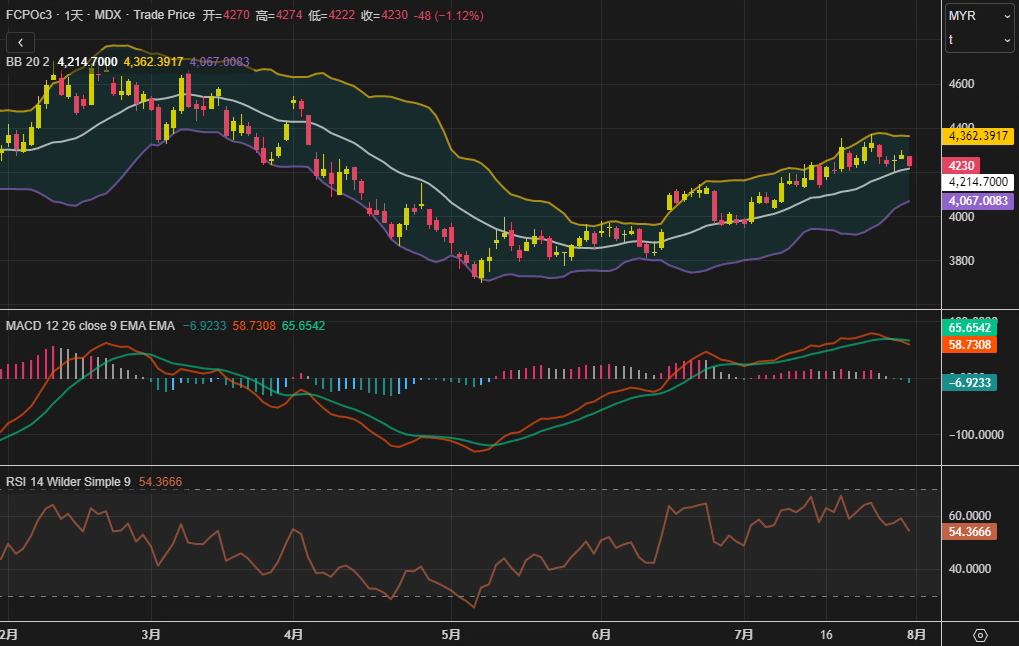Palm oil breaks through key support! The 4230 ringgit level has been breached. Will bears press on?
2025-07-31 19:06:31

Competition in oil and fats and the dual pressure of fundamentals
During the Asian session, Chicago Board of Trade (CBOT) soybean oil contracts fell 0.98%, while Dalian Commodity Exchange soybean oil (DBYcv1) and palm oil (DCPcv1) fell 0.63% and 0.8%, respectively, directly dampening sentiment in the palm oil market. David Ng, a proprietary trader at Kuala Lumpur-based trading firm Iceberg X, noted, "Palm oil prices are weakening in tandem with competing oils, and concerns about a recovery in production and sluggish exports are further exacerbating selling pressure."
The latest shipping survey data shows that Malaysia's palm oil exports fell by 6.7%-9.6% month-on-month in July, a wider decline than the previous month. While the ringgit's 0.59% depreciation against the US dollar theoretically boosted export competitiveness, demand for restocking in major importing countries has not improved. Notably, Malaysia's palm oil exports to the US surged 51.8% year-on-year to 93,000 tons in the first five months of this year, but this increase was unable to offset slower purchases from traditional buyers India and China.
Production cycle and biodiesel demand variables
As Southeast Asia enters its seasonal production boom, market concerns about inventory rebuilding are growing. A prominent institutional analyst stated in a recent report: "If August production increases by more than 10% month-over-month, inventories could breach the 2 million ton mark, testing bullish sentiment." Furthermore, fluctuations in international crude oil prices are indirectly dampening palm oil's performance. Brent crude oil fell 0.59% to $78.81 per barrel, weakening the economic viability of palm oil as a biodiesel feedstock.
However, potential policy support remains a concern. Malaysia's Ministry of Plantation Industries and Commodities recently emphasized its commitment to maintaining its mandatory B20 biodiesel blending policy, while Indonesia is also evaluating the possibility of expanding its biodiesel export quota. A Singapore-based head of commodities research believes, "If crude oil prices stabilize above $80, it could prompt Southeast Asian countries to accelerate the implementation of biodiesel projects, potentially leading to marginal improvements in palm oil industry demand."
Institutional View: Short-term pressure and long-term differentiation
Most institutions are cautious about the short-term outlook. An analysis team from a leading Kuala Lumpur-based trading house stated, "The current technical picture is converging. If the 4230-4250 ringgit support zone fails, prices could plummet to the previous low of 4100 ringgit." However, some suggest an oversold opportunity. Singapore-based vegetable oil analyst James Lee noted, "The end of the third quarter typically coincides with the start of holiday stocking in the Northern Hemisphere. If exports improve month-over-month in August, coupled with the ringgit's favorable exchange rate, prices could see a window of opportunity for recovery."

- Risk Warning and Disclaimer
- The market involves risk, and trading may not be suitable for all investors. This article is for reference only and does not constitute personal investment advice, nor does it take into account certain users’ specific investment objectives, financial situation, or other needs. Any investment decisions made based on this information are at your own risk.





















